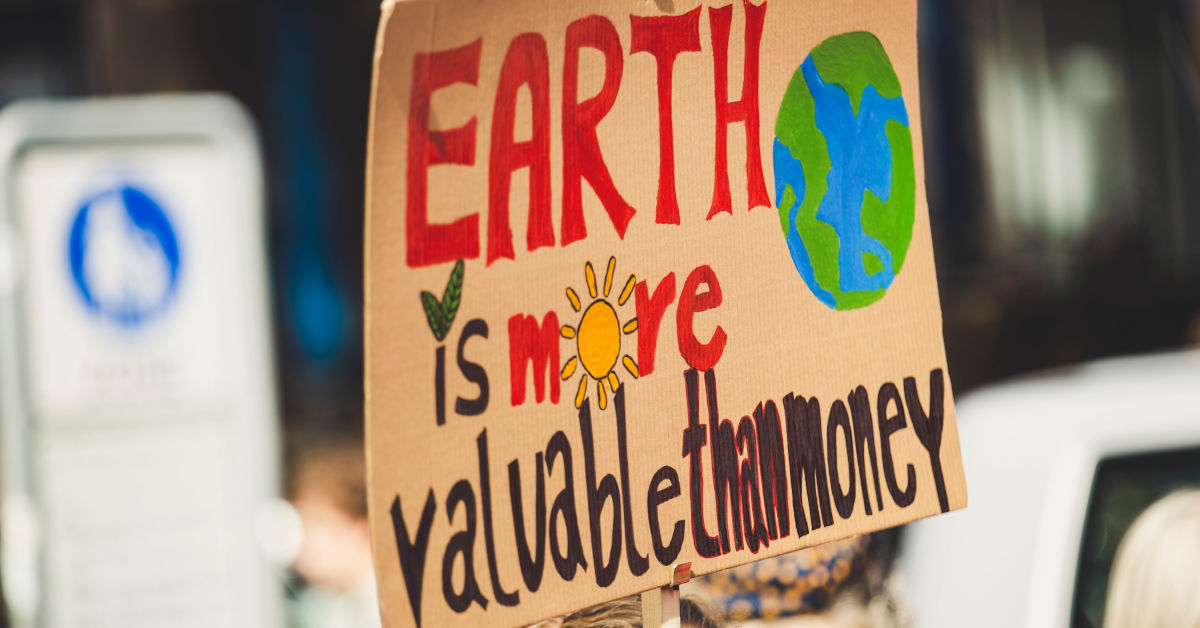The following article was written by our Special Scientific Adviser, Bill McGuire and explores a simple, if radical (to some) way to combat climate chaos. Read on and see what you think.
The prospect of dodging our temperate world’s journey into a hothouse hell looks increasingly bleak with every passing day. We think that business as usual, with a bit of tinkering around the edges, will make everything fine. These attitudes suggest that the global economy can continue to grow—and with a bit of luck, we can still stay this side of the 1.5 degrees Celsius global average temperature rise guardrail, which insulates us from catastrophic, all-pervasive climate change. This is hogwash.
Forget net zero emissions by 2050: by then the die will be well and truly cast. Greenhouse gas emissions need to fall by 45 percent within this decade to stave off climate mayhem. So far, we are on track for a measly half a percent. Even with the US back on board, the target looks like being several steps too far. Then consider how economies across the world are pouring recovery money into fossil fuels, and the path forward looks increasingly uncertain.
But—whisper it because it’s anathema to many—there is another way. It’s called degrowth: that is, the contraction of the global economy until it reaches a sustainable steady-state that fits with a level of greenhouse gas emissions compatible with keeping rising temperatures this side of the 1.5 degrees guardrail.
The idea of degrowth is not new, and it has been promoted since the 1970s as the only means of keeping human activities operating within our planet’s biophysical limits. To prevent, for example, extreme and unsustainable levels of ozone depletion, biodiversity loss, chemical pollution, soil degradation and—of course—global heating.
In the context of the climate emergency, degrowth has always been the elephant in the room; acknowledged from time to time, but rarely spoken about. A big part of the reason for this is that it is incompatible with the free-market capitalism that has insinuated itself into almost every aspect of our lives and work.
Without the prospect of ever more growth and ever more profit, today’s unfettered capitalism would wither on the branch, which is why the whole idea of a sustainable global economic system is despised by all dyed-in the-wool free marketeers. It is also the reason why technology billionaire Bill Gates, and others of his ilk, are fans of the geoengineering route, the whole point of which is to keep capitalism in the fast lane by kicking that pesky global heating into the long grass.
It is perhaps not surprising, then, that even the IPCC’s (Intergovernmental Panel on Climate Change) representative concentration pathways (RCPs)—which map a range of scenarios for the amount of greenhouse gases accumulating in the atmosphere going forward—do not include any that assume degrowth.

To address this omission, researchers Lorenz Keysser and Manfred Lenzen, of ETH – Zurich’s technical university – recently published an array of degrowth pathways in the journal Nature Communications. These demonstrate that an intentional reduction in economic output is actually less risky than a combination of continued GDP growth and geoengineering. While the authors don’t seek to imagine in detail what planned degrowth might look like, in advanced economies it would need to involve a slowdown in manufacturing, accompanied by a significant switch to green technologies and far greater focus on environmental and ecological protection and repair. If managed effectively, there would be no need for productivity to fall, nor for people to become worse off, and embracing of both a universal basic income and a four-day working week would make the transition relatively painless. Of course, a new smartphone model every year would be out of the question, but would we really miss it?
Not unexpectedly, the authors of the new work observe that the biggest obstacle to initiating a programme of global degrowth is political will. As they rightly point out, the whole idea of degrowth challenges deeply entrenched mindsets, cultures, values and power structures that would be difficult, if not impossible, to change. Probably the only way this could be done, the authors suggest, is by means of increasing pressure for change from the bottom up, via dynamic, high-profile, social movements such as Extinction Rebellion.
And then there is, of course, the need to ensure the most vulnerable are cushioned from the economic effects. Even in the unlikely case that politicians become convinced of the need to reduce GDP, the manner in which it is accomplished is crucial. To keep everyone on board and to be truly fair, it must be—and must be seen to be—just and equitable. Socio-economic changes would need to be negotiated and enacted at the global level, with reduced consumption by richer states being compensated for by increases in the poorest nations.
Numerous studies have shown that a high quality of life and improved well-being can be sustained at lower levels of energy use and GDP. Nonetheless, getting the global community to transition rapidly from hell-for-leather growth to a sustainable steady-state remains a colossal ask.
As it emerges slowly from the depths of the pandemic, during which emissions fell by around seven percent, the global community finds itself at a crossroads. It can tread the road that allows growth to surge ahead, or realign society and economy so that growth is managed to follow a downward path. At the moment, all the money appears to be on the former, despite the fact that this means turning our backs on what is almost certainly the last, best, chance to tackle the climate emergency.
Plumping for continued, unrestrained growth, will leave the door wide open to those convinced that only techie tinkering will bring global heating under control. And if this all goes pear-shaped, we will have committed our children and their children to life on an increasingly plundered and malignant world of blistering temperatures, drowned cities and a society that no longer functions.
This article was first published in Prospect magazine on May 24th 2021. It is also available on Bill’s blog, Cool Earth.
Implementing a global degrowth strategy doesn’t mean rich countries have to become poor and we all have to give up living our very comfortable lives. Tackling waste and making things which last, can give us all the luxuries we want, without destroying the planet in the process. When considering degrowth, I am always reminded of Terry Pratchett’s story of Sam Vimes’ boots. If we can help everyone to buy $50 boots instead of $10 ones, we can easily move towards degrowth.
Bill McGuire is Professor Emeritus of Geophysical & Climate Hazards at UCL. His novel, Skyseed – an eco-thriller about climate engineering gone wrong – is published by The Book Guild.
Simon West and The Team



